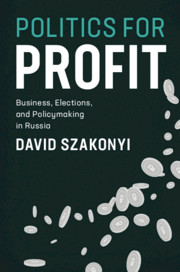Book contents
- Frontmatter
- Dedication
- Contents
- List of Figures
- List of Tables
- Acknowledgments
- Introduction
- 1 A Theory of Businessperson Candidacy
- 2 Identifying Businesspeople Who Run for Office
- 3 Economic Competition, Weak Parties, and Businessperson Candidacy
- 4 Choosing Ballots, Parties, and Delegates
- 5 Firm-Level Returns from Businessperson Candidacy
- 6 Businesspeople as Policymakers
- 7 Conclusion and Policy Recommendations
- Appendix
- Bibliography
- Index
- Series Page
Introduction
Published online by Cambridge University Press: 15 June 2020
- Frontmatter
- Dedication
- Contents
- List of Figures
- List of Tables
- Acknowledgments
- Introduction
- 1 A Theory of Businessperson Candidacy
- 2 Identifying Businesspeople Who Run for Office
- 3 Economic Competition, Weak Parties, and Businessperson Candidacy
- 4 Choosing Ballots, Parties, and Delegates
- 5 Firm-Level Returns from Businessperson Candidacy
- 6 Businesspeople as Policymakers
- 7 Conclusion and Policy Recommendations
- Appendix
- Bibliography
- Index
- Series Page
Summary
This chapter opens the manuscript with an anecdote about a prominent Russian businessperson politician as well statistical evidence about the breadth of businesspeople working in public office around the world. It then catalogues our extant knowledge of why special interests like firms seek to influence policymaking and the means through which they do so, along the way defining key terms used throughout the manuscript. Next, it introduces the puzzle of businessperson candidacy, contrasting the high financial and time costs required to run for and hold office with our lack of knowledge about the benefits to be had. The chapter then briefly outlines the main arguments and evidence presented in the book and provides a justification for why Russia is a compelling case from which to build theory. In general, businessperson candidacy has received very little if any attention from scholars, especially given how widespread it is; the last section demonstrates how this book fills that gap. The chapter then closes by presenting the contributions the manuscript makes to our understanding of business–government relations, interest group politics, descriptive representation, authoritarian institutions, and the nature of policymaking in transitioning economies.
Keywords
- Type
- Chapter
- Information
- Politics for ProfitBusiness, Elections, and Policymaking in Russia, pp. 1 - 29Publisher: Cambridge University PressPrint publication year: 2020

